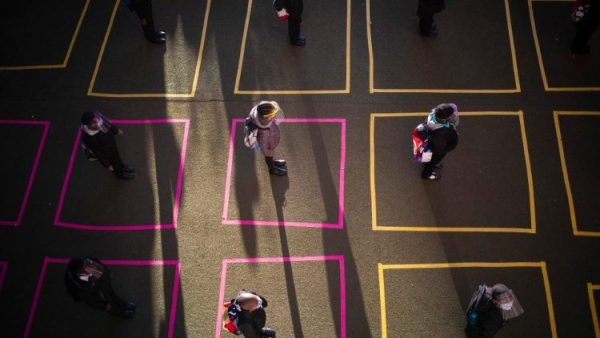WHO, UNICEF advocate for safe reopening of schools in Africa
 In the wake of prolonged school closures due to Covid-19 and their possible long-term negative effects on children, WHO and UNICEF urge governments in Africa to reopen schools following safety guidelines.
In the wake of prolonged school closures due to Covid-19 and their possible long-term negative effects on children, WHO and UNICEF urge governments in Africa to reopen schools following safety guidelines.
The World Health Organization (WHO) and the United Nations Children’s Emergency Fund (UNICEF) are urging governments in Africa to safely reopen schools, observing health measures to stem the spread of the Covid-19 virus.
In a statement on the WHO website on Thursday, the international bodies said the prolonged school closures originally aimed at keeping students safe from Covid-19 are “harming them in other ways” that may have long-lasting effects.
Results from a WHO survey in 39 sub-Saharan African countries indicate that schools are fully open in only six countries. In 19 countries, schools are partially open while in 14 others, they remain closed. A dozen countries are also planning to resume classroom learning in September, the start of the academic year in some countries.
Impact of prolonged education disruption
The statement cites “poor nutrition, stress, increased exposure to violence and exploitation, childhood pregnancies and overall challenges in the mental development of children due to reduced interaction related to school closures.”
UNICEF states that in Eastern and Southern Africa, “violence rates against children are up, while nutrition rates are down with more than 10 million children missing school meals.”
Particularly affected among this number are girls, especially those who are displaced or living in low-income households. For example, the statement points out that following the 2014 Ebola outbreak in Sierra Leone, pregnancy rates among teenagers doubled, and “many girls were unable to continue their education when schools reopened.”
Also, according to a World Bank forecast, school closures in sub-Saharan Africa could lead to “lifetime earning losses of $4500 USD per child.” And, given the reduced earning of parents forced to stay at home to take care of their children because they cannot pay for child care services, these earning losses might even be worsened.
Importance of schools
Highlighting the importance of education, WHO Regional Director for Africa, Dr. Matshidiso Moeti, noted that “schools have paved the way to success for many Africans.” Besides, “they provide a safe haven for many children in challenging circumstances to develop and thrive.”
"We must not be blind-sided by our efforts to contain Covid-19 and end up with a lost generation. Just as countries are opening businesses safely, we can reopen schools," said Moeti, adding that this decision must ensure the safety of children, teachers and parents through key measures such as physical distancing.
“The long-term impact of extending the school shutdown risks ever greater harm to children, their future and their communities,” said UNICEF Regional Director for Eastern & Southern Africa, Mohamed M. Malick Fall. “When we balance the harm being done to children locked out of schools, and if we follow the evidence, it leads children back into the classroom.”
Dr. Moeti and Mr. Fall held a virtual press conference on Thursday organized by APO Group.
Health protocols for schools
Covid-19 safety guidelines issued by the WHO, UNICEF and the International Federation of Red Cross include recommendations for physical distancing measures, canceling school events that create crowding, spacing desks when possible, handwashing facilities, wearing masks and ensuring that sick students and teachers stay at home.
They also recommend various hygiene and disinfection measures for schools to reopen safely; including daily disinfection and cleaning of surfaces, basic water, sanitation and waste management facilities, as well as environmental cleaning and decontamination.
Many schools poorly equipped
According to a WHO and UNICEF report assessing progress on drinking water, sanitation and hygiene in schools between 2000 and 2019, about a quarter of schools have basic hygiene services. Only 44 percent have basic drinking water and 47 percent have sanitation services. This means that millions of children that attend schools still lack water sanitation and hygiene.
In light of this, both international organizations are appealing to governments to “take an opportunity from the crisis” for “investment and innovative thinking,” adding that taps, buckets and soap are “quick solutions to handwashing” as children prepare to return to school.
Fr. Benedict Mayaki
Source: vaticannews.va

